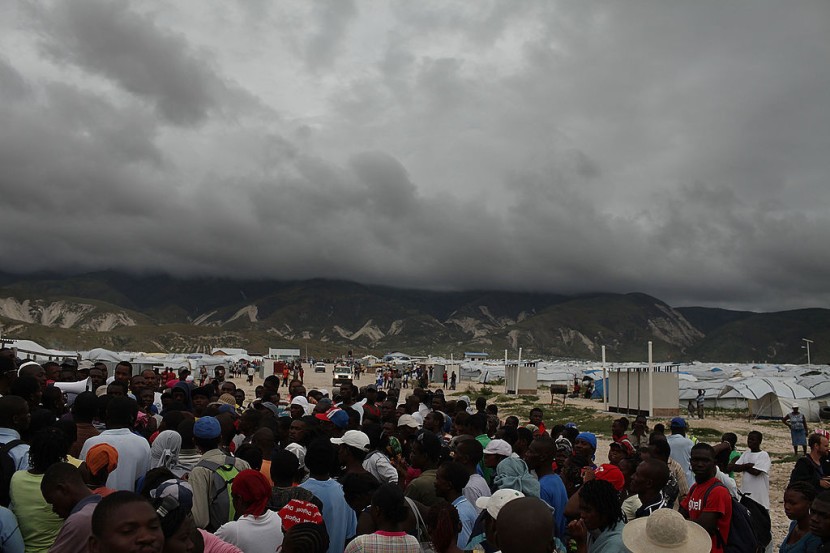
Tropical storm Grace halts the Haitian government's response to the devastating weekend earthquake on Tuesday, escalating resentment and frustration among the thousands of people who were homeless.
The tropical storm pounded southwestern Haiti, which was severely impacted by the earthquake on Saturday, and officials warned that certain regions may have had 15 inches (38 cm) of rain before the storm passed. The capital, Port-au-Prince, was also drenched. The storm hit late Monday, the same day that Haiti's Civil Protection Agency raised the death toll from the earthquake to 1,419 people killed and 6,000 people injured, many of whom had to wait for medical help outside in the scorching heat.
Tropical storm Grace swept into Haiti
Just days after a strong earthquake damaged a stretch of the island nation's so-called southwestern "claw," a renewed Tropical Storm Grace swept into Haiti on Tuesday, slamming the region with heavy rainfall. Forecasters say up to 15 inches of rain might fall in some locations before the storm passes through on Wednesday, USA Today reported.
After Saturday's earthquake, which destroyed entire villages and left hospitals inundated with the injured, thousands of Haitians crawled through rubble looking for loved ones or sought shelter. According to Bruno Maes, UNICEF's representative in Haiti, security concerns are impeding the humanitarian response.
Gangs control the main road from Port-au-Prince to the hard-hit southern region, he claimed. However, UNICEF was able to reach the impacted areas with medical supplies, bringing medical kits to three hospitals in Les Cayes including gloves, painkillers, antibiotics, and syringes to treat 30,000 earthquake victims for three months, according to Maes.
Many survivors were becoming dissatisfied with the government's lack of response. A crowd of enraged men gathered in front of one of the collapsed structures. The head of Haiti's civil protection office, Jerry Chandler, confirmed that damage assessments had to be halted due to the heavy rain since "people are becoming aggressive."
Fairfax County Urban Search and Rescue's public relations officer, John Morrison, said his team was still looking for survivors. On Monday, two US Coast Guard helicopters sent search and rescue teams to six affected areas.
Survivors of Haiti's earthquake, which killed at least 1,941 people, cried out for food, shelter, and medical attention on Tuesday as search and rescue operations started after a tropical storm dumped rain on the Caribbean island, producing severe floods.
Read Also : China Mocks US Troops Afghanistan Withdrawal, Welcomes "Friendly Relations" With Taliban
Survivors seek food, medical care as recovery operations halt
Humanitarian operations were impeded by quake damage to several major hospitals, and medics in temporary tents outdoors fought to save the lives of the many injured, including young children and the elderly. However, they were unable to assist all of them.
Per Global News, political unrest and restricted road access from the capital to the south were already complicating relief efforts due to gang control of critical junctions. Tropical Storm Grace, which had passed through Jamaica by Tuesday afternoon, aggravated the situation with flash flooding and landslides.
The United Nations announced that it has set aside $8 million in emergency assistance to help those affected. Chile, Mexico, Panama, Colombia, Venezuela, and the Dominican Republic, all in Latin America, provided food, medication, and supplies. The Us also dispatched supplies and search and rescue crews.
Although gangs had been blocking access roads for months, the UN Office for the Coordination of Human Affairs reported that "successful negotiations" had allowed a convoy to approach Les Cayes. Patients who had been camping outside ran within to avoid the tropical storm on Tuesday at the hospital in Les Cayes, some 150 kilometers (90 miles) west of the capital Port-au-Prince.
The public hospital at L'Asile, deep in a remote stretch of countryside in Haiti's southwest, illustrates the country's issues. People are still trickling up from rural communities with shattered limbs and legs four days after a massive earthquake struck this region hardest.
Sonel Fevry, the hospital's director, said five such patients arrived on Tuesday, the same day officials announced the disaster's death toll had risen to more than 500. Poor roads, poverty, and faith in natural treatment all contribute to the problem's escalation, as per ABC News.
The death toll from Saturday's earthquake has risen to 1,941 according to Haiti's Civil Protection Agency. It also brought the total number of injured to 9,900, many of whom have had to wait for medical care while lying outside in the sweltering heat and enduring a storm that brought heavy rains and strong winds on Monday night.
Perhaps the countryside was impacted worse by the quake than the cities, but the news is still coming in slowly. The L'Asile hospital's whole obstetrics, pediatrics, and surgery wing fell, yet everyone survived. Despite the collapse, the hospital was able to treat approximately 170 badly injured quake victims in makeshift tents set up in the facility's yard.
Related Article: Massive Earthquake in Haiti Leaves 1,297 Deaths, 2,800 Injured; Rescuers Race to Find Survivors
@YouTube
© 2026 HNGN, All rights reserved. Do not reproduce without permission.








